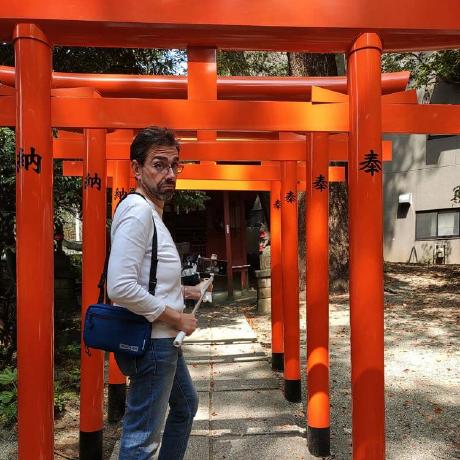The Conjugation Principle
 Antonio Barrera Mora
Antonio Barrera Mora
Introduction
Have you ever felt trapped in a toxic situation, wondering how to escape its complexity?
The solution might lie in a mathematical principle: conjugation. This principle allows us to transform complex problems into something more manageable.

Could this principle have applications beyond equations and help us navigate life's challenges?
The Toxicity of Context and the Need for Change
We often find ourselves immersed in contexts that overwhelm us with stress, negativity, and toxicity. These contexts can be personal relationships, work environments, or even ingrained habits. Addressing these problems head-on can seem daunting. However, just as in mathematics, sometimes we need a different approach to simplify the equation of our lives.
The Conjugation Principle Applied to Life
The Initial Transformation (X)
Imagine "X" represents a shift in perspective or a positive influence entering your life. It could be a new friend, a mentor, an inspiring book, or even therapy.
This new perspective gives you the tools to see your problems in a different light. Although it is true that sometimes we cannot change the context so quickly, it is also true that changes can be implemented gradually that lead to a change, a catharsis. In these cases, it can be a plus to have the help of professionals.
Applying the Change (Y)
Once you've adopted this new perspective, it's time to actively apply it to your life. This may involve making complex decisions, setting healthy boundaries, seeking new opportunities, or changing harmful habits.
Reversal (X^-1)
After going through the transformation, you return to yourself, but with renewed clarity and resilience. You've learned to handle complex situations and maintain your well-being, avoiding falling back into toxic patterns.
Practical Example
If you find yourself in a stressful job surrounded by negativity, your "X" could be seeking a support community or joining a positive professional group. Applying "Y" would mean using the strategies learned in that community to improve your work situation, such as developing assertive communication skills or seeking new opportunities. Finally, "X^-1" would be integrating these changes into your daily life, achieving greater peace and satisfaction.
The Moral
The conjugation principle is not just a mathematical tool, but a powerful metaphor for personal growth. By changing our perspective and environment, we can untangle what seems complex and free ourselves from toxicity. This principle reminds us that sometimes, the solution to our problems lies in finding an innovative approach and consistently applying it to our lives.
My Opinion (as a clinical psychologist and data scientist)
This concept resonates deeply with me.
As a psychologist, I often see how people benefit greatly from changing their perspective and environment. Cognitive-behavioural therapy, for example, is based on the idea that our thoughts and beliefs influence our emotions and behaviours. By changing our thought patterns, we can transform our life experience.
From a data science perspective, it's also interesting to analyze how changes in our environment (represented by data) can predict and explain changes in our well-being.
References
Beck, A. T. (1979). Cognitive therapy and the emotional disorders. Penguin.
Wolfram MathWorld. "Conjugation." Accessed June 2024. MathWorld.
Devlin, K. J. (2000). The math gene: How mathematical thinking evolved and why numbers are like gossip (Vol. 329). New York: Basic Books.
We have created a video explaining the principle that you can visit
We hope you find our content useful. If you need our expertise in psychology or data science, you can visit us at SywInNet.
This article is licensed under a Creative Commons Attribution-ShareAlike 4.0 International (CC BY-SA 4.0).
Subscribe to my newsletter
Read articles from Antonio Barrera Mora directly inside your inbox. Subscribe to the newsletter, and don't miss out.
Written by

Antonio Barrera Mora
Antonio Barrera Mora
Soy un científico de datos y psicólogo clínico con una década de experiencia viviendo en Japón. A lo largo de estos años, he tenido la oportunidad de sumergirme profundamente en la cultura japonesa, mientras desarrollo mi carrera profesional en el análisis de datos y la psicología clínica.